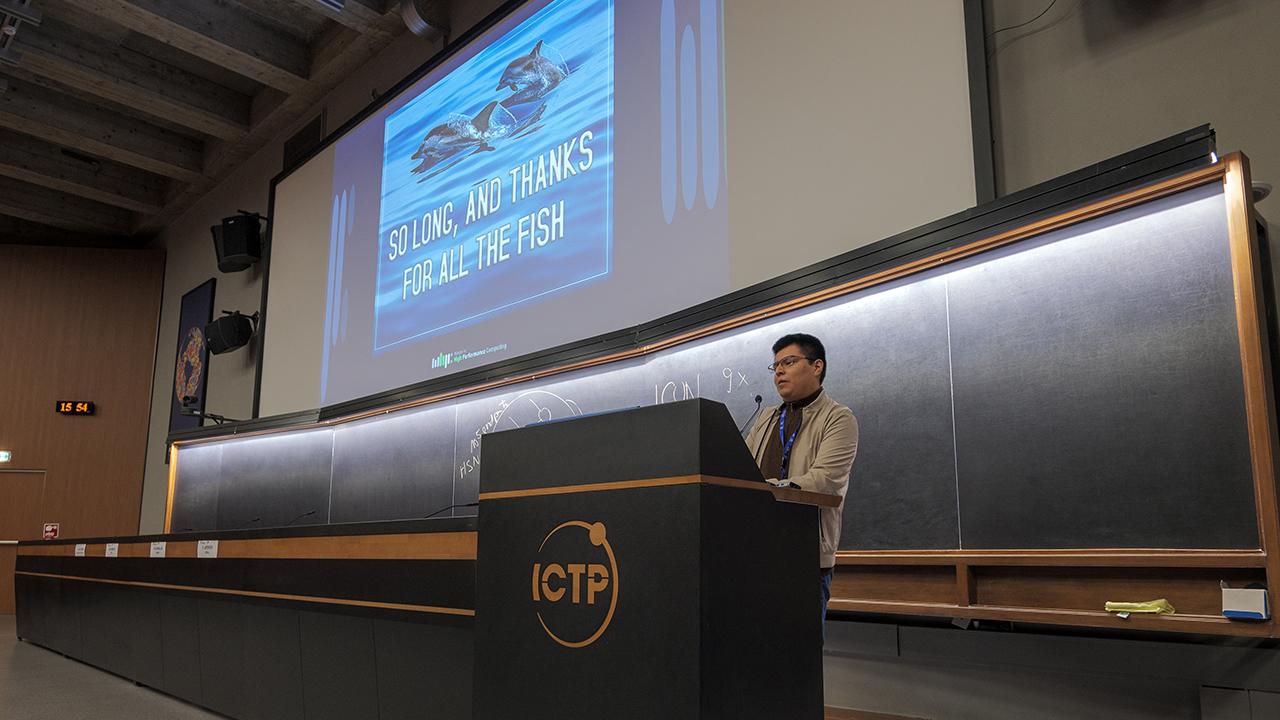
The Master in High Performance Computing (MHPC) is a joint programme between ICTP and SISSA, preparing students for careers in the fast-growing field of high performance computing. Since its founding in 2014, 109 students have graduated from the programme; about one third of them come from developing countries and were selected and funded by ICTP.
This year marks the programme’s 10th anniversary and the celebrations took place on 1 March at ICTP. During the ceremony, ICTP Director Atish Dabholkar stressed the relevance and success of the programme: “This joint SISSA-ICTP programme has continued to be extremely relevant over the past ten years, as shown by the number of applications we receive and by the extraordinary rate of employment of the programme’s alumni,” he said
ICTP's mission to build sustainable science in the developing world adds a global context to the MHPC programme: over the years, the Centre has supported the enrolment of 29 students from 18 technology lagging countries, nearly all of whom have found a relevant job, either in academia or in industry. Dabholkar also underscored the importance of providing training in high performance computing to students from the global South: “If we do not involve developing countries in these fast-evolving fields, the science gap can only increase. The MHPC programme participates in advancing ICTP’s commitment towards developing countries,” he explained.
"The Master's programme in HPC represents a unique opportunity for young scientists from developing countries, providing an intensive advanced technical and scientific training that does not exist in the academic education of these countries,” added Ivan Girotto, HPC applications specialist and director of the MHPC at ICTP.
Almost all students of the programme have succeeded in finding a job after attending the programme, partly thanks to its hands-on, practical component. Over a period of 6 to 8 months students are required to develop a project in collaboration with a research team, working with one of the programme’s more than 30 partners. These include academic collaborations, both within the Trieste System (OGS, Università di Trieste), and the national level (Istituto Italiano di Tecnologia, CNR-Istituto Officina dei Materiali), but the programme’s success importantly relies also on industrial partnerships with Italian companies (Fincantieri, Leonardo and Generali) and with international ones (IBM, Intel and NVIDIA).
Several alumni of the programme took part in the ceremony and shared their success stories. Alexander Christhoper Trujillo Ochoa was among the students funded by ICTP in the 2021-2022 edition of the programme and is currently a HPC Research Fellow at Leonardo Labs, in Genoa, Italy. At the ceremony, Ochoa presented his thesis, which was awarded the Best Thesis prize. He also stressed the relevance of HPC in a world where AI is becoming more and more important: “Behind AI models there are huge HPC infrastructures. Having the skills provided by the MHPC would be an amazing asset for anyone interested in working with AI.”
The celebrations of the MHPC 10th anniversary continued with three success stories from MHPC alumni. Alberto Cazzaniga, a researcher in data analysis and machine learning at AREA Science Park, in Trieste, who received the 2019-2020 best thesis prize, explained how the MHPC led him to start a career he loves and develop collaborations that he cherishes.
MHPC alumna Serafina Di Gioia became a postdoctoral researcher in machine learning and applied calculations at ICTP after graduating from the Master’s programme in 2022. She also holds a Master’s degree in theoretical physics from the University of Torino and a PhD in Physics from the University of Trieste. She applies data science tools to tackle problems in cosmology. “Thanks to the MHPC I developed a new passion for machine learning that I did not know before,” she said. Di Gioia is currently involved in a new project at ICTP which aims to build an HPC ecosystem in developing countries. “Becoming part of the very international community of ICTP makes this my dream job,” she said.
MHPC alumnus Stefano Piani currently works at the National Institute of Oceanography and Applied Geophysics; he attended the programme’s first edition during academic year 2014-2015. “Ten years after I started the MHPC, and thanks to it, I am in a career where I keep on learning and to me this is amazing,” Piani explained, concluding with an enthusiastic message to his younger colleagues at MHPC: “Follow your curiosity, the possibilities you have are infinite!”
The ceremony featured testimonies from representatives of two of the programme’s partners: Stefano Salon, currently a researcher at OGS, and Mahya Karbalaii, vice president of the science team at Danieli &. C. Officine Meccaniche. The celebrations ended with the panel discussion 'Training next generations of HPC experts' featuring Thomas Schulthess, Mahya Karbalaii, Sandro Scandolo (ICTP) and Fabio Affinito (Cineca).
The MHPC is currently accepting applications. Students from developing countries are eligible for funding from ICTP and should apply through this link: Master in High Performance Computing – Open Call
















